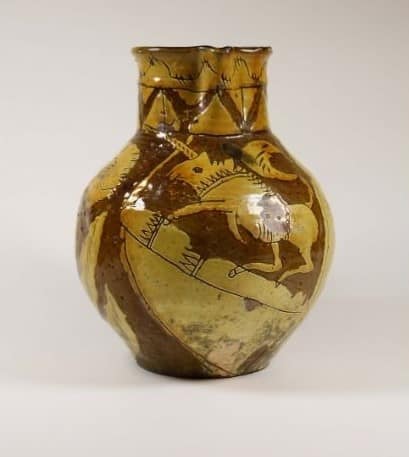
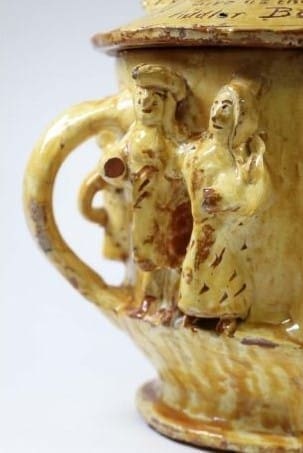
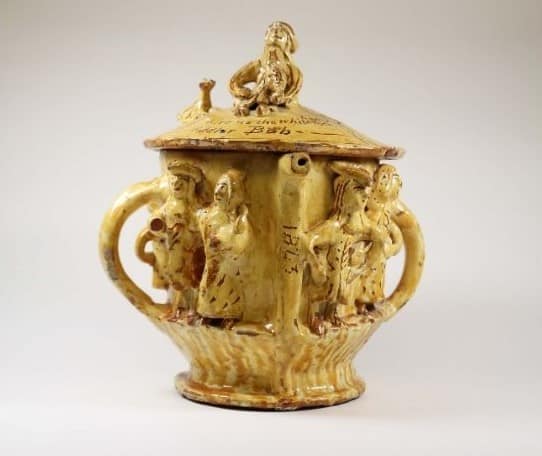
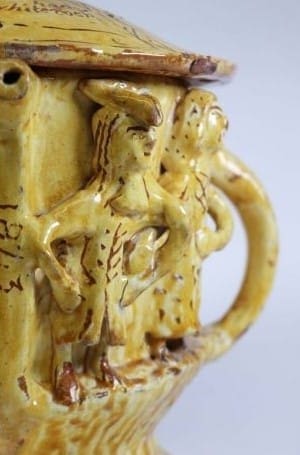
Intro
This exhibition explores the theme of ‘folk’ art found in The Burton’s ceramic collections. Running alongside “The Folk Archive” in galleries 1 & 2 by Turner prize winner Jeremy Deller & Alan Kane.
The exhibition focuses on items that are associated with tradition, celebration, humour and how form and slipware sgraffito decoration is used to reflect our shared cultural and social traditions.
“Well, here’s luck to barley mow and the land that makes it grow.
We’ll drink to old John Barleycorn, here’s luck to barley mow.
So fill up all the glasses, lads, and stand them in a row:
A gill, a half-pint, a pint, a pint and a quart and here’s luck to barley mow.”
The Barley Mow, James Henry Dixon’s Ancient Poems, Ballads, and Songs of the Peasantry in England (1846)
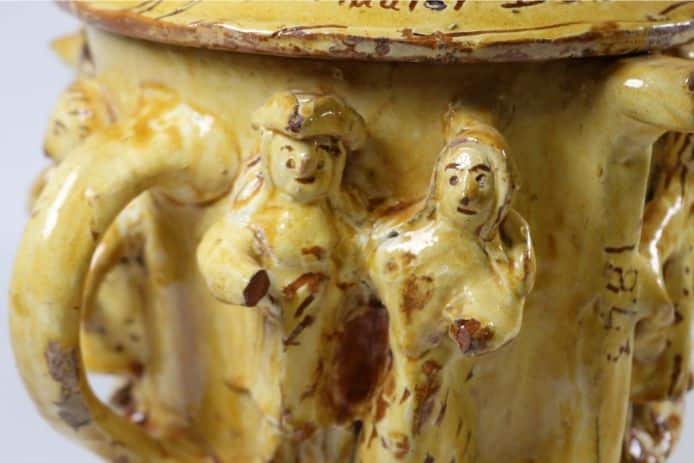
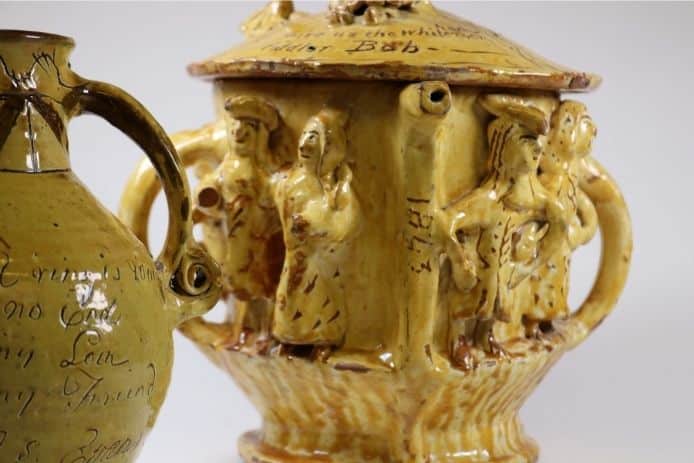
Celebrations part one
Popular in homes and taverns, an inscription on the side of a puzzle jug typically challenges the drinker to consume its contents without spillage. This olden day tourist trap would amuse and entertain people in villages, towns and cities all over Devon during celebrations throughout the year.
“Here gentlemen come try your skill.
I’ll lay a wager if you will,
That you don’t drink this liquor all,
Without you spill or let some fall.”
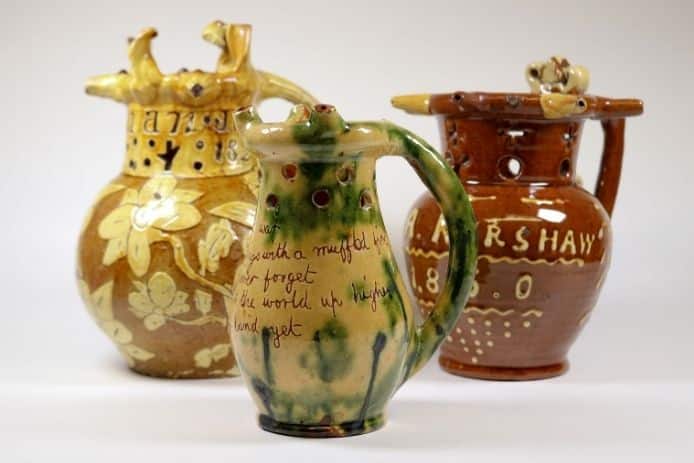
Celebrations part two
A traditional wassail is designed to scare off bad spirits from your orchard, to encourage harmony between the people and the trees and to provoke a good harvest. Observed by South-West cider making counties since Anglo-Saxon times.
In Devon, on the 12th night, a farmer (and friends), would circle his best fruit tree while drinking the following toast three times;
“Here’s to thee, old apple tree
Hence thou may’st bud, and whence thou may’st blow,
And whence though may’st bear apples enow!
Hats full! Caps full!
Bushel-bushel-sacks full,
And my pockets full too! Hazza!”
Devonshire & Other Original Poems with Some Account of Ancient Customs, Superstitions & Traditions, by Eliza Tozer. 1873.
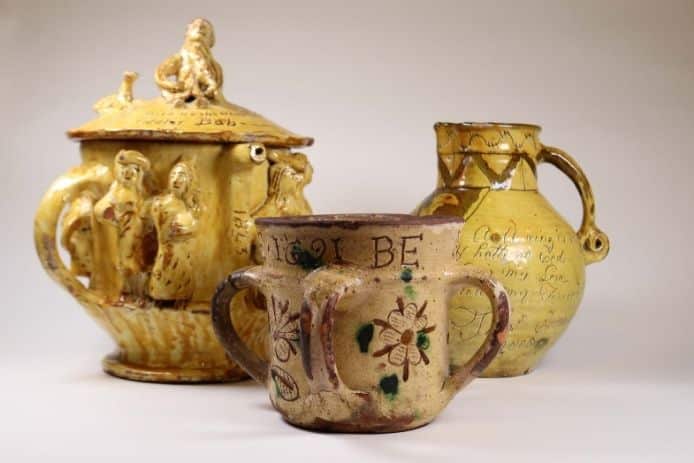
Harvest
The word ‘harvest‘ comes from the Old English word hærfest meaning ‘autumn’, aptly the season for gathering the food of the land. Whether by ‘Crying the neck’ or gathering for a traditional plough blessing the beginning end of the harvest has always been done with style by Devon Folk.
“Well, here’s luck to barley mow and the land that makes it grow.
We’ll drink to old John Barleycorn, here’s luck to barley mow.
So fill up all the glasses, lads, and stand them in a row:
A gill, a half pint, a pint, a pint and a quart and here’s luck to barley mow.”
The Barley Mow, James Henry Dixon’s Ancient Poems, Ballads, and Songs of the Peasantry in England (1846)
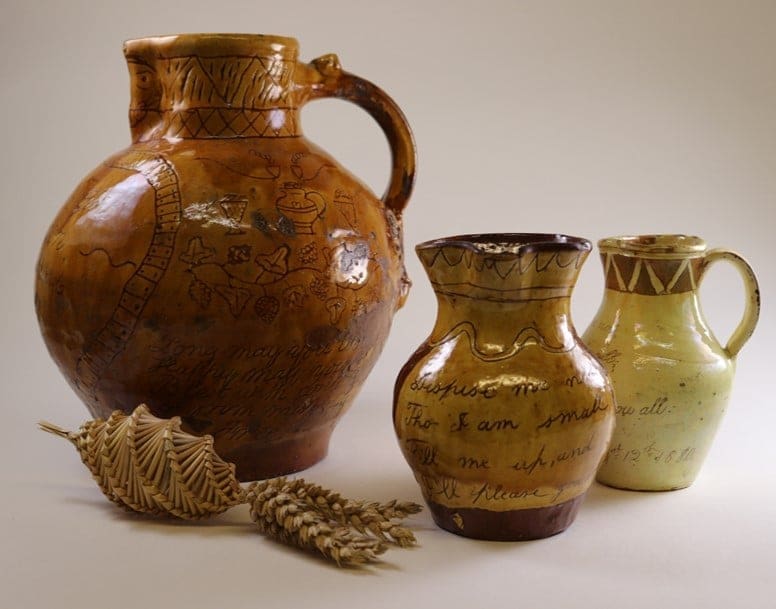
North Devon jug, white slip and sgraffito script, “Despise me not for I am…” (BIGBG.2009.01.0390)
North Devon jug, Bideford Ware. Floral sgraffito of flowers and script, “Despise me not for I am…” (BIDBG.2009.01.0033)
Nature
Devon folklore is full traditional charms, cures and mythical seaborne creatures. Plants were used to predict how the weather would affect your crops as well as your future.
On Halloween evening, clear the grate of all ashes, and ensure that the fire is burning brightly. Each person present should set a large hazel nut upon the lowest bar, and sit in silence to await the result…
She whose nut first blaze, we be the first to marry.
She whose nuts first cracks, will be jilted.
She whose nut first jumps, will soon start on a journey but will never marry.
She whose nut smoulders will have sickness, disappointment in love and perhaps die young.

Watch the video
View 3D Models


